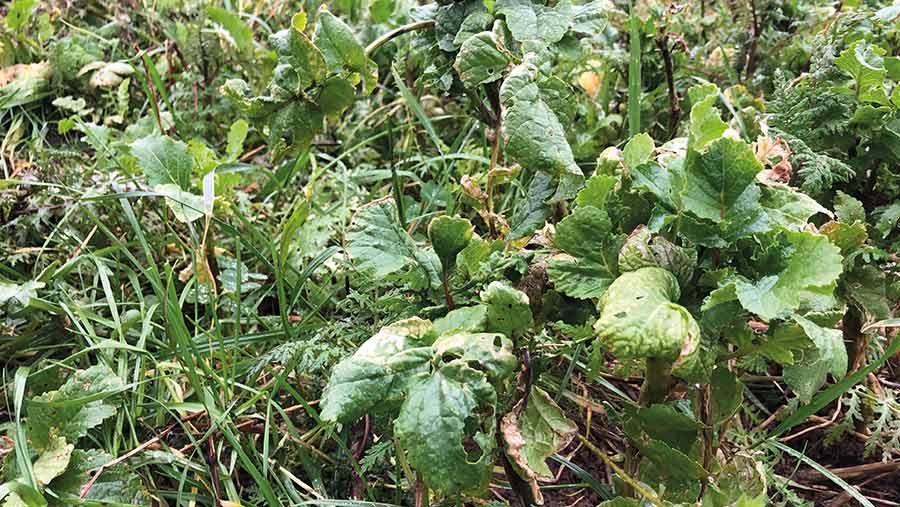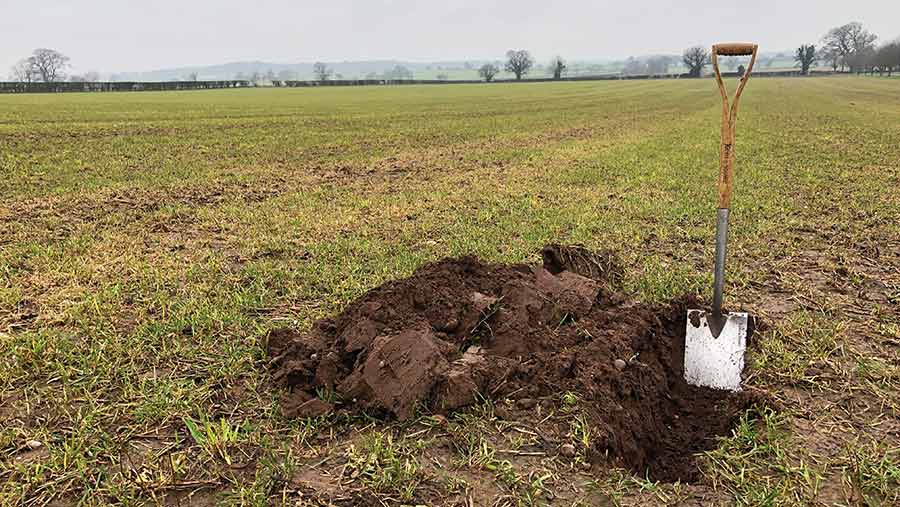Why mixed farmer exited pigs to focus on agroecology cropping
 © MAG/Emma Gillbard
© MAG/Emma Gillbard Shropshire arable and pig farmer Harry Heath has begun a journey into the world of agroecology in the hope it will future-proof his business, having made the difficult decision to exit the pig industry.
Pigs were at the centre of Whitley Manor Farm near Newport for 52 years, but in the midst of the volatile market crisis Mr Heath saw no other option than to get out of pigs and focus instead on the arable enterprise.
See also: Suffolk farm tests 5 new technologies for post-Brexit future
Driven mostly by the desire to farm in a more positive light both financially and environmentally, he began the agroecology transition back in 2019, applying ecological principles to his arable enterprise.
With well over three-quarters of the farm’s 600 sows gone and the rest soon to follow, Mr Heath aims to make his 200ha of arable land more profitable, and combat an invasion of herbicide-resistant Italian ryegrass.
Farm facts – Whitley Manor Farm, Shropshire
- Cropping includes: winter wheat, winter oilseed rape, bicrop of spring beans and oats, and hybrid rye
- Yields: 9t/ha winter wheat, 8t/ha winter barley, and 4.75t/ha oilseed rape
- Soil type: 80% sand
- Family decided to exit pig industry amid market crisis
- Pursuing agroecology to improve arable profitability and sustainability
- Grew a sunflower crop to effectively tackle influx of Italian ryegrass
- Introducing cover crops and sheep grazing to restructure soil
- Harry Heath also runs an agroecology contracting service for local farmers, offering direct- drilling, spraying, fertilising and combining through the regenerative farming approach
Working closely with his Hutchinson’s agronomist, Ed Brown, as part of the Helix farm project, he also plans to improve soil health and reduce reliance on inputs through the introduction of direct drilling, cover crops and a wider, more flexible rotation.

Harry Heath © Hutchinsons
Heavy cultivations
A legacy of heavy cultivations at Whitley Manor Farm growing wheat, potatoes and sugar beet provided good returns for a number of years, but over the past decade soil health has noticeably declined.
“We were using a lot of intensive soil cultivations. Whether this was power harrowing, subsoiling, using large de-stoners or rotationally ploughing, it was a major cornerstone in soil degradation,” he says.
Soils have a high sand content (80%) and physical cultivation led to soil slumping and structure loss. Erosion from heavy rainfall events became more apparent and worm counts were low.
“It was clear we had taken more from the ground than we had replaced, despite the addition of pig muck,” says Mr Heath.
In fact, P and K indices measured well, but on further analysis these nutrients were locked up and were inaccessible to crops.
“We needed to look at how we could preserve and maintain our soils in which our livelihoods depend, and agroecology would certainly help us achieve this,” he says.
What is agroecology?
Agroecology is the application of ecological principles to agricultural systems, explains Mr Brown.
“A range of agroecology techniques can be applied to farms of any shape and size, offering a more biological farming approach which doesn’t just focus on chemical and physical soil properties.
For Mr Heath, being a Helix farm host provides him with a valuable opportunity to see how different agroecological approaches can not only reduce input costs, but also improve yields through six key areas:
- Minimise disturbance to the soil
- Always keep the soil covered
- Maintain living roots throughout the year
- Maximise diversity
- Integrate livestock
- Keep an open mind.
“All six points can be applied to crops, fields and soils. Admittedly, it may not be possible to apply all at the same time, but it’s important to challenge what you know and be flexible,” says Mr Brown.
Making the farming transition meant a huge change of mindset for Mr Heath, particularly moving from what he described as “asthetic agriculture” where fields must look neat and tidy.
“Direct drilling with the John Deere 750A, this is no longer the case, but we have to think about the long-term objectives,” he says.
Baseline soil analysis was taken at the start of the procedure to effectively monitor and measure any relative changes. However, the process has not come without its challenges.
“We had a difficult autumn back in 2019 and we soon discovered potatoes had to be removed from the rotation as cultivations were too intense for our soil.
Combating ryegrass
Another challenge for Mr heath was overcoming an influx of Italian ryegrass which has proved difficult to control since its arrival five years ago.
Mostly resistant to herbicides, cultural control methods such as spring cropping and rotational ploughing were used to reset three high-pressure fields.
Consequently, winter barley is no longer part of the rotation. One particularly concerning field was planted to spring barley, but weed populations were so high they swamped the spring crop.
Left with no other option, the field was ploughed and planted to sunflowers at the end of May. Fortunately, the sunflowers effectively shaded out the ryegrass and outcompeted the grassweed.
November saw the sunflowers harvested and sold as bird seed, before direct drilling a winter wheat blend of Crusoe, Extase, Costello and Gleam. Ryegrass control has proved effective so far.
Mr Heath has also integrated cover crops into the rotation, helping re-stabilise soil structure, with the addition of sheep grazing.
Another ryegrass-infested field was sown to a Hutchinsons maxi cover crop mix and this spring will be ploughed and planted to a spring bicrop of beans and oats (also known as “boats”).
“Covers will be grazed and ploughed in as shallow as possible to remove ryegrass pressure. There’s no good spraying off the crops and direct drilling as we know there will be an influx of weeds,” says Mr Brown.
The spring bicrop will then be harvested as a complete crop and later separated, with the intentions of tackling ryegrass pressure and eliminating nitrogen fertiliser requirements.

© MAG/Emma Gillbard
Flexible approach
Ensuring a flexible farming system has never been more important for Mr Heath.
“Agroecology is not a singular defined approach, but one that responds to the field or situation that we have in front of us, whether this is varied weather or volatile markets.”
With this is mind, the cropping rotation is now winter wheat, winter oilseed rape, winter wheat and spring beans, and the spring beans and oats bicrop.
Hybrid rye is also being trialled to assist with timely oilseed rape planting.
So far, results seem promising as rapeseed crops are planted earlier and get off to a good start, enabling them to withstand the cabbage stem flea beetle attack.
As oilseed rape is Mr Heath’s main cash crop deeper cultivations are required for good establishment, but he now aims to minimise this.
Another adaptable change is the use of liquid fertiliser which enables a range of amendments to be added to the mix such as foliar sprays and molasses to help feed soil biology.
Flexibility of drill dates are also important as it takes time for the soil to become right. “We found starting early in the autumn to get cover crops established and waiting later in the spring is beneficial.”
The benefits of agroecology
- Suitable for farms of any size
- Improved soil health and structure
- Greater farm resilience
- Enhances natural resources and reduces input costs
- Opportunity to future-proof business
- Has the support of government strategy
- Potential access to new markets and income stream

